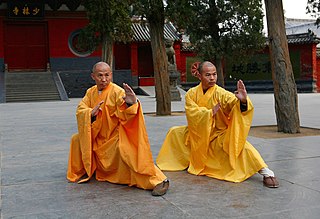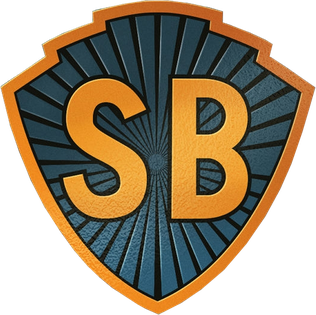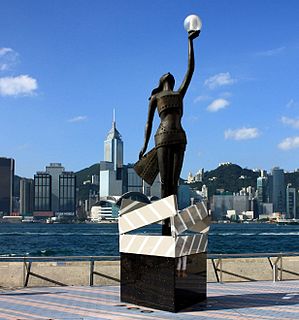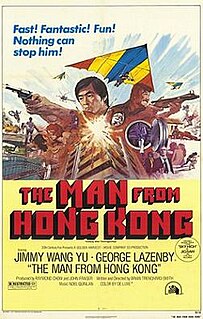Related Research Articles

John Woo Yu-Sen SBS is a Hong Kong film director, producer and screenwriter. Woo is known for his highly chaotic action sequences, stylized imagery, Mexican standoffs, frequent use of slow motion and allusions to wuxia and Western cinema. He was also a pioneer of heroic bloodshed films and the gun fu genre in Hong Kong action cinema, before working in Hollywood films.

In general, kung fu/kungfu refers to the Chinese martial arts also called wushu and quanfa. In China, it refers to any study, learning, or practice that requires patience, energy, and time to complete. In its original meaning, kung fu can refer to any discipline or skill achieved through hard work and practice, not necessarily martial arts. The Chinese literal equivalent of "Chinese martial art" would be 中國武術 zhōngguó wǔshù.

Fang Shilong, known professionally in English as Jackie Chan and in Chinese as 成龍, is a Hong Kong actor, filmmaker, martial artist, and stuntman known for his slapstick acrobatic fighting style, comic timing, and innovative stunts, which he typically performs himself. Chan has been acting since the 1960s, performing in more than 150 films. He is one of the most popular action film stars of all time.

Shaw Brothers (HK) Ltd. was the largest film production company in Hong Kong, and operated from 1925 to 2011.

The cinema of Hong Kong is one of the three major threads in the history of Chinese language cinema, alongside the cinema of China and the cinema of Taiwan. As a former British colony, Hong Kong had a greater degree of political and economic freedom than mainland China and Taiwan, and developed into a filmmaking hub for the Chinese-speaking world.
Kung Fu is an American action-adventure martial arts Western drama television series starring David Carradine. The series follows the adventures of Kwai Chang Caine, a Shaolin monk who travels through the American Old West, armed only with his spiritual training and his skill in martial arts, as he seeks Danny Caine, his half-brother.

Half a Loaf of Kung Fu is a 1978 Hong Kong action comedy martial arts film directed by Chen Chi-hwa and written by Jackie Chan, who also starred in the lead role. The film co-stars Dean Shek and James Tien. The film was released in Hong Kong on 1 July 1978. Chan plays a bumbling kung fu student who becomes involved in a series of adventures in one of his first forays into the kung fu acrobatic slapstick comedy style that would become his signature.
Bruceploitation is an exploitation film subgenre that emerged after the death of martial arts film star Bruce Lee in 1973, where filmmakers from Hong Kong, Taiwan and South Korea cast Bruce Lee look-alike actors ("Lee-alikes") to star in imitation martial arts films, in order to exploit Lee's sudden international popularity. Bruce Lee look-alike characters also commonly appear in other media, including anime, comic books, manga, and video games.

Kung Fu Hustle is a 2004 action-comedy film directed, produced, co-written by, and starring Stephen Chow. The film tells the story of a murderous neighbourhood gang, a poor village with unlikely heroes, and an aspiring gangster's fierce journey to find his true self. Eva Huang, Yuen Wah, Yuen Qiu, Danny Chan Kwok-kwan and Leung Siu-lung co-starred in prominent roles. The martial arts choreography is supervised by Yuen Woo-ping.
Hong Kong action cinema is the principal source of the Hong Kong film industry's global fame. Action films from Hong Kong have roots in Chinese and Hong Kong cultures including Chinese opera, storytelling and aesthetic traditions, which Hong Kong filmmakers combined with elements from Hollywood and Japanese cinema along with new action choreography and filmmaking techniques, to create a culturally distinctive form that went on to have wide transcultural appeal. In turn, Hollywood action films have been heavily influenced by Hong Kong genre conventions, from the 1970s onwards.

Jimmy Wang Yu was a Taiwanese actor, film director, producer, and screenwriter. Wang rose to fame in 1967 with his starring role in One-Armed Swordsman, a martial arts film produced by the Shaw Brothers Studio, and The Chinese Boxer (1970).

Brian Medwin Trenchard-Smith is an English-Australian filmmaker and author, known for his idiosyncratic and satirical low-budget genre films. His filmography covers action, science fiction, martial arts, dystopian fiction, comedy, war, family, thriller, romance and erotica, and his works tend to be cross-genre pieces.

Bruce Leung Siu-lung is a Hong Kong martial artist and actor who has appeared in many Hong Kong martial arts movies. He often appeared billed as "Bruce Leung", "Bruce Liang", "Bruce Leong", or "Bruce Leung Siu-lung", and is thus generally grouped among the Bruce Lee clones that sprang up after Lee's death in the subgenre known as Bruceploitation.

Jackie Chan began his film career as an extra child actor in the 1962 film Big and Little Wong Tin Bar. Ten years later, he was a stuntman opposite Bruce Lee in 1972's Fist of Fury and 1973's Enter the Dragon. He then had starring roles in several kung fu films, such as 1973's Little Tiger of Canton and 1976's New Fist of Fury. His first major breakthrough was the 1978 kung fu action comedy film Snake in the Eagle's Shadow, which was shot while he was loaned to Seasonal Film Corporation under a two-picture deal. He then enjoyed huge success with similar kung fu action comedy films such as 1978's Drunken Master and 1980's The Young Master. Jackie Chan began experimenting with elaborate stunt action sequences in The Young Master and especially Dragon Lord (1982).

Killer Constable is a 1980 Hong Kong martial arts-action film directed by Chih-Hung Kwei, starring martial arts star Chen Kuan-tai. The movie, produced by the Shaw Brothers studio, is a loose reworking of the 1969 movie The Invincible Fist by Chih-Hung Kwei's frequent collaborator, the film director Chang Cheh.
Wang Kuan-hsiung was a Taiwanese actor who was a well-known and popular leading man in the kung fu film genre of the 1970s and 1980s.

The Man from Hong Kong, originally released in the US as The Dragon Flies, is a 1975 action film written and directed by Brian Trenchard-Smith in his directorial debut and starring Jimmy Wang Yu and George Lazenby, with Hugh Keays-Byrne, Roger Ward, Rosalind Speirs, Rebecca Gilling, Sammo Hung, Grant Page and Frank Thring in supporting roles. The first film to be made as an international coproduction between Australia and Hong Kong, it serves as a satire of the James Bond and Dirty Harry franchises, combined with tropes of the concurrent chopsocky craze. Its plot follows Inspector Fang Sing Leng (Yu) of the RHKPF's Special Branch, who travels to Sydney to perform an extradition, only to find himself locked in battle with Jack Wilton (Lazenby), the city's most powerful crime lord.

Deathcheaters is a 1976 Australian action adventure film directed by Brian Trenchard-Smith and starring John Hargreaves and Grant Page.
The Stuntmen is a one-hour documentary for Australian TV written and directed by Brian Trenchard-Smith.
Carter Wong is a Chinese actor and martial artist, who is mainly known for roles in Kung Fu action movies. The biggest movies he was featured in are Big Trouble in Little China (1986), and Yong zheng ming zhang Shao Lin men (1977). As an actor, he contributed to more than seventy martial arts films. He also worked as a stuntman in films, and was the fighting instructor for the movie Rambo III. Wong is still active in martial arts.
References
- 1 2 3 Brian Trenchard-Smith, 'Kung Fu Killers', ACMI, August 2008 Archived 28 March 2012 at the Wayback Machine Retrieved 23 September 2012
- ↑ "BATTLING IT OUT— HUNG FU STYLE". The Australian Women's Weekly . National Library of Australia. 1 May 1974. p. 21. Retrieved 16 October 2012.